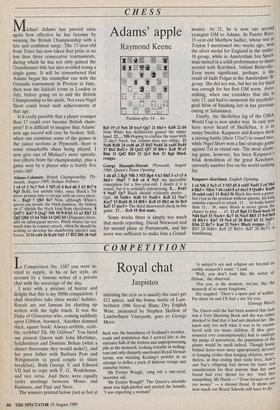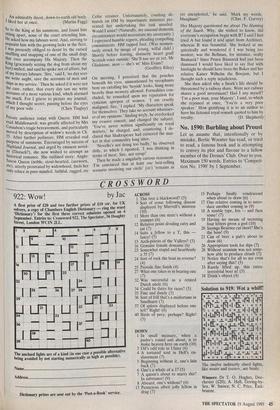COMPETITION
Royal chat
Jaspistos
In Competition No. 1587 you were in- vited to supply, in his or her style, an account by a famous writer of a private chat with the sovereign of the day.
I note with a mixture of horror and delight that this is my 500th competition. I shall therefore take three weeks' holiday. Royals are not famous for chatting up writers with the right touch. It was the Duke of Gloucester who, coming suddenly upon Gibbon, boomed, 'Another damned thick, square book! Always scribble, scrib- ble, scribble! Eh, Mr Gibbon?' You faced our present Queen with John Mortimer, Solzhenitsyn and Dominic Behan (what a dinner threesome they would make!), and her poor father with Barbara Pym and Wittgenstein (a good couple to share breakfast). Both George V and Edward VII had to cope with P. G. Wodehouse, and vice versa. And there were equally tricky meetings between Moses and Rameses, and Paul and Nero.
The winners printed below (not so hot at
imitating the style as is usually the case) get £12 apiece, and the bonus bottle of Lam- berhurst 1986 Seyval Blanc Dry English Wine, presented by Stephen Skelton of Lamberhurst Vineyards, goes to George Moor.
Such was the beastliness of Scotland's weather, roads and population that I arrived late at the entrance hall of the forlorn and unprepossessing. pile as the monarch, looking irritable in welling- tons and only distantly sanctioned Royal Stewart tartan, was wielding Keating's powder in an attempt to deflea a pack of hideous orange and cinnabar brutes.
'Mr Evelyn Waugh,' sang out a one-eyed, muscular oaf.
'Mr Evelyn Waugh?' The Queen's astonish- ment was high-pitched and excited the hounds. 'I was expecting a woman!'
'A subject's sex and religion are beyond an earthly monarch's remit,' I said. 'Well, you don't look like the writer of Helena,' she observed.
'Nor you, at the moment, ma'am, like the monarch of so many kingdoms.' She laughed. 'There's a spare pair of wellies. Put them on and I'll find a use for you.' (George Moor)
The Queen said she had been assured that Jude was a Very Shocking Book and she was rather shocked to find that it had not shocked her. She knew only too well what it was to be encum- bered with too many children. If Men (pro- nounced very contemptuously) had to undergo the pangs of parturition, the population of the planet would be small indeed. Though hooks behind doors were more appropriately devoted to hanging clothes than hanging children, never- theless, in thus ending their futile lives, Jude's and Sue's offspring had shown far more real consideration for their parents than her own brood had ever shown for her. 'And that misspelling, Mr Hardy — "Done because we are too menny" — a shrewd thrust. It shows just how much our Board Schools still have to do.' A. n admirably direct, down-to-earth old body.
I liked her at once. (Martin Fagg)
So to the King at his summons, and found him sitting apart, none of the court attending him. lie asked how my labours went. And, striving to acquaint him with the growing lacks in the fleet, I was presently obliged to desist by the cursed snuffling and snapping of one of the small dogs that ever accompany His Majesty. Then the King (graciously seizing the dog from about my feet) smiled, and said he spoke not of affairs, but of my literary labours. `Sire,' said I, `no day sees me write aught, save the accounts of men and ships in my service.' Then he asked if it were not the case, rather, that every day saw me write accounts of a more various kind, which alarmed me much. For I grieve to picture my journal, which I thought secret, passing before the eyes of my poor wife . . (Chris Tingley) Private audience today with Queen. HM had read Middlemarch: was greatly affected by Mrs Casaubon's tragic bereavement, and particularly moved by description of widow's weeds in Ch. 55. After further politesses, HM revealed real Purpose of summons. Encouraged by success of Highland Journal, and urged by eminent novel- ist (Disraeli?), she now wished to attempt an historical romance. She outlined story: Anglo- Saxon Queen (noble, stout-hearted, careworn, etc), utterly prostrated by widowhood, finds her only solace in pure-minded, faithful, rugged, etc Celtic retainer. Unfortunately, crushing de- mands on HM by importunate ministers pre- vented her undertaking this task unaided. Would I assist? (Naturally, my unusual domestic circumstances would necessitate my anonymity.) I expressed humble regrets, pleading compelling commitments. HM tapped foot. (Was momen- tarily struck by image of young, wilful child.) Shortly before leaving, distinctly heard gruff Scottish voice outside: 'She'll nae see ye yet, Mr Gladstone, mon — she's wi' Miss Evans!'
(Geoffrey Riley) On meeting, I perceived that the pouches beneath his eyes, unmentioned by sycophants bent on extolling his 'boyish' looks, hung more heavily than memory allowed. Formalities con- cluded, he remarked upon my reputation for cynicism apropos of women. 'I am cruelly maligned, Sire,' I replied. 'My characters speak for themselves. They take no account whatsoev- er of my opinions.' Smiling wryly, he overlooked my evasive conceit, and changed the subject. 'You've never written significantly on royal matters,' he charged, and, countering, I de- clared that Shakespeare had cornered the mar- ket in that commodity long since. `Novello's not doing too badly,' he observed drily, to which I riposted, 'I was thinking in terms of meat, Sire, not syrup!'
Then he made a singularly curious statement. 'I'm convinced that at least one best-selling scenario involving our circle' (sic) 'remains as
yet unexploited,' he said. 'Mark my words. Maugham!' (Chas. F. Garvey)
Her Majesty questioned me about The Hunting of the Snark. Why, she wished to know, did everyone's occupation begin with B? I said I had tried A but found it arid apart from Architect, whereas B was bountiful. She looked at me quizzically and wondered if I was being too modest; was the Bellman, for instance, really Bismarck? Since Prince Bismarck had just been dismissed I would have liked to say that with hindsight he should have been the Baker and her relative Kaiser Wilhelm the Boojum, but I thought such a reply injudicious.
She then asked why a Snark's life should be threatened by a railway share. Were not railway shares a good investment? Had I any myself? 'I'm a poor man, your Majesty', I said, to which she rejoined at once, 'You're a very poor speaker.' How gratifying it is to an author to have his fictional royal remark quoted to him by



















































 Previous page
Previous page